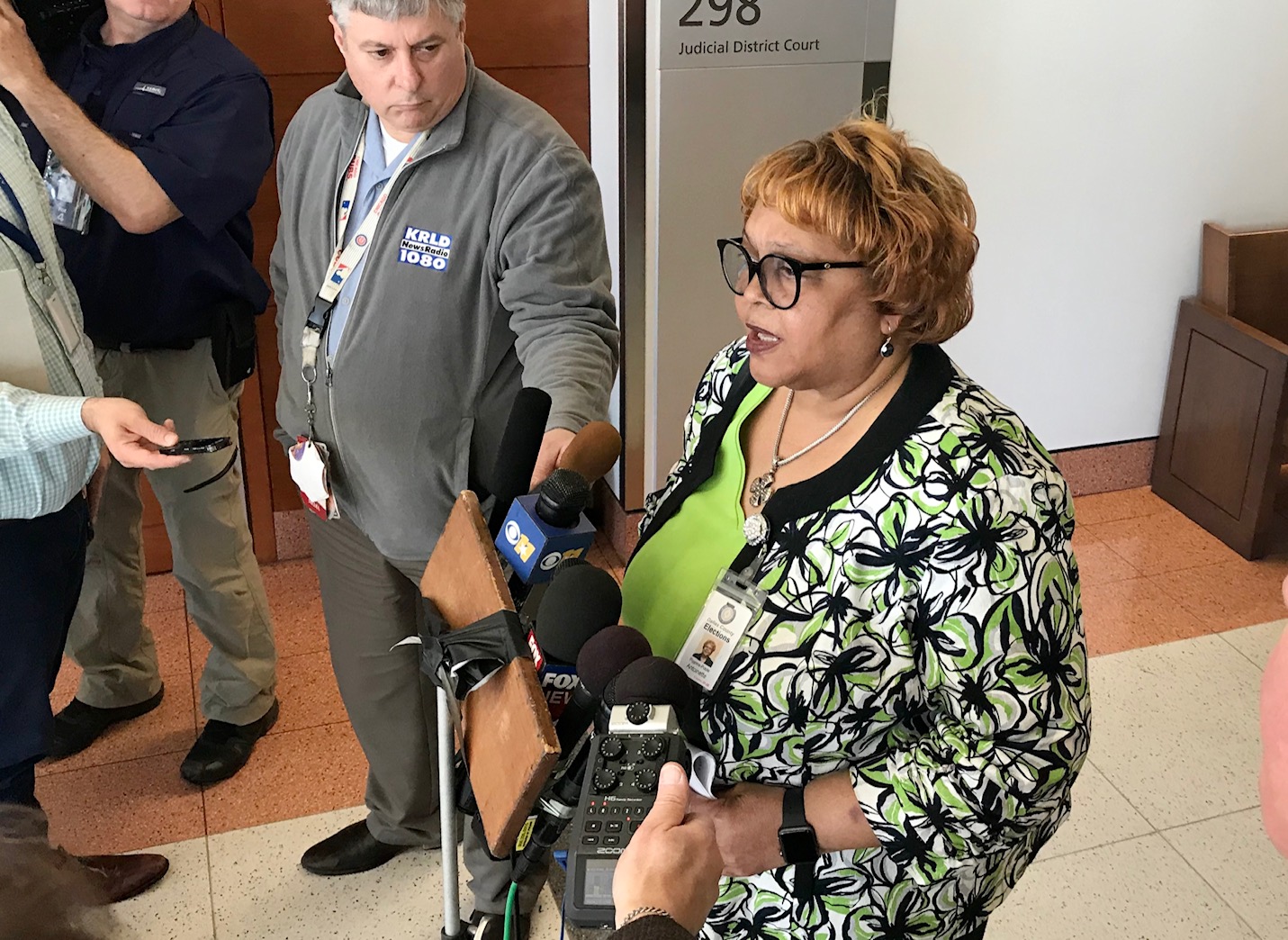In a crowded Dallas County courtroom on Tuesday, Judge Emily Tobolowsky authorized a recount of 44 ballot locations that will almost certainly mean nothing for results but have launched the county into a politics-fueled debate about how elections work.
Both party chairs were present at the hearings over the Super Tuesday results, although only the Republicans sent legal representation. Neither side believes the votes will turn any elections. County Commissioner John Wiley Price stood at the back of the room during proceedings.
The whole hearing lasted a little over an hour. County Elections Administrator Toni Pippins-Poole was the only witness to take the stand, and she spent most of her 42 minutes testifying about the mind-numbing details of the elections process. Each vote is transmitted to a thumb drive and then backed up on another thumb drive. The backup drives are placed into pouches, which are then driven to one of 13 regional sites. The results from the drives get loaded onto laptops. Unofficial results are then sent to the central count office for verification. The machines also create a backup paper ballot, which is what elections officials will begin pulling out of boxes tomorrow morning.
Officials first discovered an error when they tried to square the number of ballots received with the number of people who checked in at the various polling locations. There were discrepancies at 44 of the 454 polling places.
Lewis Sessions, the attorney representing the Republican Party, admitted to his own confusion. He questioned Pippins-Poole about how those backup paper ballots were kept. He questioned the data center in which voter registration information is stored. He asked about how a lack of judges might have impacted the procedures. He also seemed to question whether the system favored one party over another. Because of the shortages in election judges, Sessions pressed about what would happen at voting locations that only had one judge. Typically, a location would have two judges and two tabulating machines—one for Republicans, one for Democrats. But Pippins-Poole told him that single-judge locations had machines that accepted votes from both parties. She said the judges knew the difference.
“Reading between the lines, it sure sounded like the attorney for the Republican Party was insinuating someone might have rigged the system,” Democrat Chair Carol Donovan said in the hallway after the hearing.
Sessions eventually seemed to back off that line of thinking. He’d opened the hearing asking for more time. He wanted the hearing postponed until Friday so that he could go through what he called an “expedited discovery,” interviewing people around the election process. Sessions did not like that he was handed a list of the 44 ballot locations in question only that morning, and said that he would largely be operating “in the dark” without those additional three days. Tobolowsky said no.
After questioning Pippins-Poole, Sessions’ final arguments made clear the party did not object to a recount, so long as the elections code is followed “to a T.” He said that this was an accident not of either party’s making. Tobolowsky and the attorneys ironed out the details and signed the paperwork.
Afterward, in the hallway, Republican Party Chair Rodney Anderson told a pile of TV cameras that he’d like to see a “thorough examination” of how the county conducts elections. “I would love for the County Commissioners Court, based on this, to request an outside auditor to come in and evaluate the process,” he said. “Because the process is obviously not working.”
He stopped short of calling for Pippins-Poole’s ouster, something Republican Dallas County Commissioner J.J. Koch did on Monday. Blame was thick on all sides even before Tuesday. Price called the situation a Republican “sabotage.”
“I think the Republicans need to own some of the responsibility, because it was they who chose to staff less than half the voting centers,” Donovan said after the hearing. “As a result of that, the Democratic election judges had to run both primaries where there was not a Republican judge. The alternative to that would’ve been to close down all those voting centers that the Republicans had not staffed. Because there was a staffing center, we had long lines and there was some confusion. And for them to now, in the news, point the finger at Toni Pippins-Poole, appears to be disingenuous.”
Pippins-Poole says she believes the issue is a result of human error, nothing done deliberately. She did offer that a two-party primary system complicates the procedures. And under the two-party system, Dallas County cannot require judges to go through training. They offer it. They can’t require it. With the crunch on judges this election, about half of them were new. It’s difficult to tell whether all those received training.
“I would have to go back and talk to over 200 judges to make sure that every single one did,” said Anderson. “But that is our intent, to make sure that we have very well-trained judges conducting elections.”
Officials start cracking open those ballot boxes at 8 a.m. They are expected to encompass between 7,000 and 8,000 votes.





